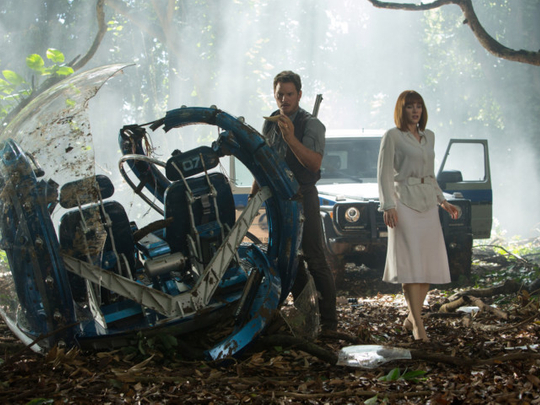
“A million dollars isn’t cool,” said Justin Timberlake as Sean Parker in The Social Network. “You know what’s cool? A billion dollars.”
He was talking about Silicon Valley, but he might as well have meant today’s Hollywood. And lately, the movie business has been hot enough to be very cool.
When Jurassic World crossed $1 billion (Dh3.67 billion) globally on Monday after just 13 days of release, it did it faster than any movie before. And it wasn’t just the first film this year, or even this season, to reach that mark. Jurassic World is the third billion-dollar movie this summer following Furious 7 ($1.5 billion) and Avengers: Age of Ultron ($1.4 billion).
Those two films already rank among the five highest grossing films ever, and Jurassic World is certain to join them. A billion dollars is starting to look easy.
The summer box office got off to a so-so start, but, suddenly, business is booming at the multiplex. After Jurassic World set an opening record two weeks ago, almost doubling expectations, Pixar’s Inside Out followed up with a forecast-busting debut of its own, with $90.4 million.
An industry where the sky is often rumoured to be falling, for the moment, is roaring.
“Audiences love to go to the movie theatre,” says Paul Dergarabedian, senior media analyst for box office data firm Rentrak. “I don’t want to hear any more that people don’t want to go to the movie theatre and they just want to sit on their couch. They want to do both. That outside-of-the-home experience is essential and these two weekends prove it.”
The twin hits couldn’t be more different. One is an Earth-stomping franchise entry that cynically alludes to its own corporate profit-driven existence, the other is a rainbow-coloured burst of originality. When it comes to moviemaking, no rule is so set in stone that its opposite isn’t true, too.
Jurassic World, both a sequel and a reboot, is directed by Colin Trevorrow but also came, importantly, with Steven Spielberg’s name attached (as executive producer). The fourth Jurassic Park film — like the runaway success of Furious 7 — has essentially proven, without a doubt, the new math of Hollywood: The money (especially in billion-form) is in franchises.
Author and journalist Mark Harris on the website Grantland mourned the success of Jurassic World as the death of something else: “What used to be the backbone of Hollywood moviemaking, namely self-contained, non-repeatable scripts, now threatens to become an anomaly, a charity act, a niche, a tithe to awards season, or a shippable option.”
What’s striking about this new wave of franchise frenzy is that it’s not even taking Hollywood’s A-game. Jurassic World was virtually assured of making gobs of money, but few expected it be the biggest summer hit of all time. “As disposable as used Kleenex,” is how movie blogger David Poland of Movie City News described it, echoing the sentiments of most critics.
The Fast & Furious franchise also looks odd ranked just below Titanic. Yet, propelled by Furious 7 and Jurassic World, Universal Pictures, which distributed both, has already had the biggest year ($3.8 billion) in its 103-year history. Some of the upcoming summer sequels (Terminator: Genisys, Magic Mike XXL, Minions) will surely be cheered by the recent box office numbers.
Pixar, which is owned by Disney, has its own plans for more sequels (Finding Dory, Toy Story 4, The Incredibles 2), but the large opening of Inside Out — the largest opening weekend by a wholly original property, surpassing Avatar — proves that a good idea, well told, can still drive enormous audiences.
“The solution or the antidote to that historical challenge was putting out something great,” says Dave Hollis, distribution head at Disney. “This business really does respond to great big events, to great storytelling, to great character development. And Pixar is known for those emotions and relatability and sophistication. As a result, we’re seeing something that is not just good for this movie but is really good for the business.”
Other factors are contributing, too. There are more theatres, especially internationally. (However, China, the second-largest marketplace after North America, is now entering a “blackout” of foreign titles in favour of only home-grown releases.) And after dwindling returns, higher-priced 3-D tickets are also selling better. Nearly half of the Jurassic World domestic gross has come from 3-D.
The summer to date is up about 11 per cent over last year, according to Rentrak, though that’s still 5 per cent off the pace of Hollywood’s record $4.75 billion summer in 2013. A bad Memorial Day weekend (when Disney’s Tomorrowland flopped) hurt overall business, and no smaller sized releases have really broken out (though the Brian Wilson biopic Love & Mercy is doing very well).
The blockbusters may be becoming so big that they swallow up everything else.
“It’s such a fragile ecosystem, the summer box office,” says Dergarabedian. “The perception can change at the drop of a dime. A couple weekends like this can create enough momentum to carry through the rest of the summer, but we’ll have to wait and see how the other films perform.”












